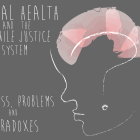
The Art of Interrupting Deadly Youth Violence
|
“I want these gang members to know it ain’t the only way,” said Rico, a 27-year-old standing in the doorway of a dusty bodega on Kingston Avenue in Brooklyn.
Juvenile Justice Information Exchange (https://jjie.org/tag/community-based-alternatives/page/6/)

“I want these gang members to know it ain’t the only way,” said Rico, a 27-year-old standing in the doorway of a dusty bodega on Kingston Avenue in Brooklyn.

Too many kids are starting to use alcohol and drugs, addiction rates are soaring and lives are being destroyed. Now is the pivotal moment to bring these issues front and center.

The MacArthur Foundation announced it will increase its juvenile justice reform funding by some $15 million, a major part of which will be used to establish the new Models for Change Resource Center Partnership.
“Right now there are no go-to places to get the kind of information, resources, toolkits, [and] access to colleagues who have ‘been there done that,’” for would-be juvenile justice reform advocates, said Laurie Garduque, director of justice reform for the MacArthur Foundation.

COVINGTON, Ga. -- This small community to the east of Atlanta isn’t necessarily the kind of locale one would associate with progressive juvenile justice policies. Yet here, deep in the rustic Georgian countryside, the local juvenile court has embraced an innovative model where keeping kids out of trouble, the courtroom and especially detention has become an utmost priority.

An employee of a youth service program in Douglas County, Ga., has been charged with child exploitation after allegedly sending sexually explicit text messages to a 16-year-old boy. The community-based alternative program, Youth Villages -- a program headquartered in Memphis, Tenn., with a presence in several states, including Indiana, New Hampshire and Oregon -- was profiled by JJIE earlier this summer. Christiana Brendi Freeman, a 25-year-old from Austell, Ga., had a bond hearing Thursday at the Douglas County Magistrate Court. Youth Villages Inner Harbour Campus, a residential treatment program, is located in nearby Douglasville, Ga. According to the Douglas County Sentinel, Freeman had sent nude pictures to a minor she had worked with at the Inner Harbour Campus.

The de-emphasis of mental health funding is not an aberration across the United States. From 2009 until 2011, 31 states enacted major mental health budget cuts.

After two years of providing very minimal services, New Hampshire’s Children in Need of Services (CHINS) program is scheduled to crank up again on Sept. 1. Prior to 2011, the state’s CHINS program had been in operation for several decades, serving approximately 1,000 children a year. However, budget cuts ordered by state Republicans, who controlled the state’s legislature, forced the CHINS program to reduce its services to around 50 cases annually, according to The Concord Monitor.

In a pair of feature stories published yesterday, (on Georgia's reform efforts and issues and two young men in the system) JJIE described two modes of intensive at-home treatment that show great promise to improve outcomes for emotionally disturbed youth in the delinquency system, both of which cost far less than incarceration or treatment in a residential treatment center.

If it's possible for a public policy research topic to be "in vogue," juvenile justice has been a craze for the past decade. Bookshelves and flash drives have been filled with statistics and studies of crimes by kids and against kids and what approaches are best at preventing and responding to both. The evidence-based practices evolving from this research have helped reduce crime and the number of incarcerated children in America. The bumper crop of research is due in large part to the confluence of tight state budgets and the commitment of the MacArthur Foundation and several other foundations, which have insisted on the collection of data and analysis -- the evidence of best practices. [Editor’s note: The MacArthur Foundation is a funder of the JJIE.] The latest harvest in that bumper crop has grabbed the attention of policy wonks and could result in even more use of preventative practices that keep kids out of prison cells and deliver successful and less expensive responses at the community level.

Georgia leaders are embracing reform in juvenile justice, but serious gaps and significant roadblocks still prevent many emotionally-troubled youth from receiving the best and most cost-effective care.